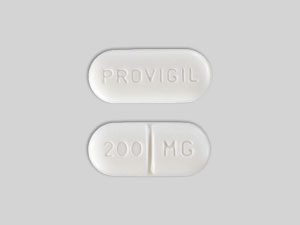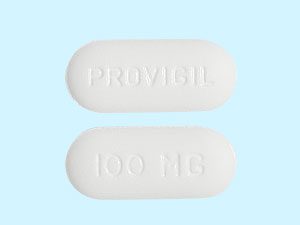Buy Generic Provigil Online
Showing all 2 resultsSorted by popularity
Provigil, generically known as Modafinil, is a central nervous system (CNS) stimulant. It is primarily used for the treatment of conditions such as narcolepsy, sleep apnea, and shift work sleep disorder. It promotes wakefulness and helps improve focus and concentration. Modafinil changes certain natural chemicals in the brain, helping to enhance alertness and reduce excessive sleepiness in patients. It is often considered a less addictive alternative to traditional stimulants.
How Does Provigil Work?
Provigil generic increases dopamine levels in the brain by blocking its reuptake into neurons, which helps improve alertness and focus. It also affects other neurotransmitters like norepinephrine, serotonin, and histamine, which further enhance wakefulness.
Mechanism:-
It works on various neurotransmitters in the brain, including dopamine, norepinephrine, and serotonin. It prevents the reuptake of dopamine, leading to increased levels of these neurotransmitters in synaptic spaces. This action contributes to improved focus and wakefulness.
Composition:-
Medication Provigil is a racemic compound. The chemical name for Provigil is 2-[(diphenylmethyl)sulfinyl]acetamide. The molecular formula of Provigil is C15H15NO2S and the molecular weight is 273.35. Each Provigil tablet contains Modafinil as the active ingredient. The inactive ingredients include lactose monohydrate, croscarmellose sodium, microcrystalline cellulose, magnesium stearate, pregelatinized starch, and povidone.
What Is Provigil Used For?
Provigil is prescribed to manage excessive sleepiness caused by narcolepsy, obstructive sleep apnea, and shift work sleep disorder. It can also be used off-label for conditions like Provigil for ADHD or to boost cognitive performance and focus.
Dosage Of Provigil:
The dosage of Provigil varies for different conditions. Such as:
Narcolepsy: Take Provigil 200 mg once daily, typically in the morning.
Obstructive Sleep Apnea: Start with 200 mg once a day. Take it early in the morning, usually after waking up.
Shift Work Sleep Disorder: Take 200 mg approximately one hour before starting your work shift.
People With Liver Problems: Provigil 100 mg per day, Doctor generally prescribes a lower dosage for people with liver conditions.
For Off-Label Use: The dosage varies based on individual needs and should only be taken under medical supervision.
Missed Dose or Overdose:
If you miss a dose, take it as soon as you remember. However, if it is late in the day, skip the missed dose to avoid disturbing your sleep at night as the Provigil drug is a wakefulness-promoting agent. Also, do not double up on doses to make up for a missed dose.
An overdose of Provigil may result in symptoms like agitation, restlessness, confusion, chest pain, increased heart rate, trouble breathing, irritability, trouble sleeping, hallucinations, etc. If you find you or your child has taken too much of this drug, call 911 or your doctor for emergency medical support, otherwise, it may result in fatal outcomes.
Risk Factor and Side-Effects Of Provigil:
Using Provigil pill may come with mild to serious side effects. Some effects impact physical well-being, while others can affect mental health. So be cautious while using this drug and discuss with your healthcare provider if any of these side effects listed below occur.
Common Side Effects:-
Headache
Nausea
Dry mouth
Dizziness
Insomnia
Decreased appetite
Nervousness
Diarrhea
Runny Nose
Back pain
Serious Side Effects:-
Chest pain
Difficulty breathing
Skin rash or allergic reactions
Depression
Suicidal Thoughts
Hallucinations
Psychosis
Irregular heartbeat
Mood changes
Fever, chills, or sore throat
Swollen lymph nodes
Rash
Itching
Severe dizziness
Tremors
Vomiting
Dark urine, jaundice
Seek immediate medical attention if any of the above serious side effects are cited.
Interactions of Provigil with Other Drugs:
Provigil medicine can interact with a variety of other medications, which can impact its effectiveness or increase side effects. Always consult with your doctor about all medications, supplements, or herbal products you are using before starting Provigil. Avoid starting, stopping, or changing the dosage of any medications without consulting your healthcare provider.
Interactions with Specific Drugs:- Some drugs may interact directly with Provigil, such as street drugs like methamphetamine or MDMA (“ecstasy”). Provigil may decrease the effectiveness of hormonal birth control (e.g., pills, patches, or rings), potentially leading to unintended pregnancy. Inform your doctor if you experience any new spotting or bleeding, as these can indicate that your birth control is less effective.
Medications Affected by Provigil:- Provigil may slow the breakdown of certain drugs in the body, leading to a higher risk of side effects. This includes medications like diazepam, phenytoin, propranolol, and omeprazole. If you use these medications, your doctor may adjust your dose or monitor you more closely to manage potential side effects.
CYP3A4 and CYP2C19 Interactions:- It affects enzymes like CYP3A4 and CYP2C19. This can cause changes in the breakdown of medications, either speeding up or slowing down their effects. Meanwhile, medications like clomipramine or propranolol may have a prolonged effect due to slowed breakdown, increasing the risk of side effects.
Caution with MAO Inhibitors:- Combining Provigil with MAO inhibitors (such as isocarboxazid, phenelzine, and selegiline) may result in severe side effects, including high blood pressure, chest pain, and increased body temperature. You should not use Provigil within 14 days of taking an MAOI.
Interactions with Caffeine and OTC Products:- Caffeine can increase Provigil’s side effects. Limit your intake of coffee, tea, and other caffeinated beverages, as well as chocolate. Certain over-the-counter medications, particularly those used for coughs, colds, or diet aids, may also raise heart rate or blood pressure when combined with Provigil.
Always consult with your healthcare provider before making any changes to your medication regimen to avoid potential interactions and ensure the safe use of Provigil.
Warnings & Precautions:
The use of Provigil comes with various warnings that you should be aware of and several precautions should be taken when using Provigil to avoid severe health complications.
Heart Conditions: Provigil may increase heart rate and blood pressure. Patients with heart conditions such as arrhythmias or hypertension should monitor their cardiovascular health closely.
Psychiatric Effects: It can cause anxiety, mood swings, or even hallucinations in some individuals, particularly those with a history of mental health issues. If you experience mood changes or other psychiatric symptoms, contact your healthcare provider.
Potential for Abuse: Although less addictive than some other stimulants, Provigil still carries a risk of dependence, especially when misused for cognitive enhancement.
Pregnancy and Breastfeeding: Women who are pregnant or breastfeeding should use Provigil only under strict medical supervision, as it may have adverse effects on the baby.
Operating Machinery: Provigil can impair reaction time and judgment, so avoid driving or operating heavy machinery until you know how it affects you.
Storage & Disposal:
Store Provigil in a tightly sealed container at room temperature, away from moisture, heat, and direct light. To prevent any kind of accidental ingestion, Keep it out of reach of children and pets.
Dispose of Provigil using a drug take-back program if available. If not, mix the medication with a substance like coffee grounds or cat litter, place it in a sealed plastic bag, and dispose of it in household trash.
Alternatives:
If you are looking for alternatives to Provigil, here are a few suggested alternatives listed below:
Nuvigil (Armodafinil): A similar medication that contains the R-enantiomer of Modafinil, offering similar wakefulness-promoting effects.
Adderall (Amphetamine/Dextroamphetamine): A stimulant that treats ADHD and narcolepsy but carries a higher risk of dependence.
Ritalin (Methylphenidate): A stimulant alternative for ADHD and narcolepsy.
Lifestyle Adjustments: Regular sleep schedules, a balanced diet, and exercise can help manage symptoms of sleep disorders.
Cognitive Behavioral Therapy (CBT): This can help address issues related to shift work sleep disorder and improve sleep habits.
Frequently Asked Questions (FAQ):
How long does Provigil Last?
Provigil can stay in your urine for up to 2-3 days, in blood for about 10-12 hours, and in hair for up to 90 days, depending on dosage and metabolism.
Is Provigil an antidepressant?
No, Provigil is not an antidepressant. It is a wakefulness-promoting agent used to treat excessive sleepiness.
Can Provigil be taken with coffee?
Caffeine may increase the side effects of Provigil, such as anxiety and rapid heart rate. It is best to limit caffeine intake while taking this medication.
What happens if a non-sleep disorder patient takes Provigil?
In people without sleep disorders, Provigil may increase alertness and focus but can also cause side effects like anxiety, restlessness, or insomnia. It should only be used under medical supervision.
How can I get prescribed Provigil?
Consult a healthcare provider about your symptoms and medical history. If they find it appropriate for your condition, they may provide a prescription for Provigil.


